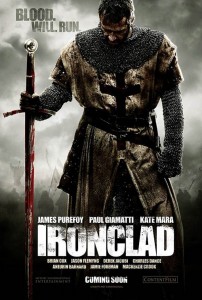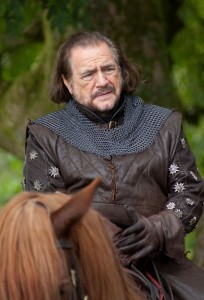 It’s not everyday you get to speak with Brian Cox, a man who has been an excellent character on screens, in theaters, and on stage for decades now. From originating the role of Hannibal Lecter, to voicing Boggis in Fantastic Mr. Fox, to his place in the Bourne films, to something like Super Troopers– Cox is just one of those actors who is never not awesome. Even when he appears in the smaller films, he never phones it in (or carrier-pigeons it in, as some of his other illustrious classically trained UK colleagues will in smaller parts) and he’s always a memorable presence.
It’s not everyday you get to speak with Brian Cox, a man who has been an excellent character on screens, in theaters, and on stage for decades now. From originating the role of Hannibal Lecter, to voicing Boggis in Fantastic Mr. Fox, to his place in the Bourne films, to something like Super Troopers– Cox is just one of those actors who is never not awesome. Even when he appears in the smaller films, he never phones it in (or carrier-pigeons it in, as some of his other illustrious classically trained UK colleagues will in smaller parts) and he’s always a memorable presence.
In Ironclad, Brian Cox joins James Purefoy and Paul Giamatti in a story taking place almost immediately after the signing of the Magna Carta, as the newly restricted King John finds petty vengeance against the Barons by reclaiming his castles. He finds difficulty at Rochester castle when a particularly badass Templar Knight (Purefoy) and a particularly stubborn Baron (Cox) fight back. It’s described as a kind of Magnificent Seven meets 300 by way of Braveheart. That’s a lot of films to mash up, but despite its limited budget and VOD release, it’s a hardcore film that is not afraid to show a man beaten to death with his own arm in the very tough battles scenes. This is a true-blue action flick with a little bit of highfalutin’ character actor flavor. And I definitely enjoyed watching Brian Cox hurl old-english slurs and curses at a smug horse-backed Paul Giammati!
The film is available today (June 8th) on VOD, and will hit theaters in exactly one month. You can see the unrated trailer here.
 I had a very limited few minutes with Cox to talk, and in that short time he exuded relaxed wisdom while he talked about period costumes, Apes, choosing his roles, and my name…
I had a very limited few minutes with Cox to talk, and in that short time he exuded relaxed wisdom while he talked about period costumes, Apes, choosing his roles, and my name…
Enjoy!
To start off, let’s talk about how you got involved in Ironclad a little bit. Was this a typical ‘read the script, sign on’ kind of thing, or did you have some other relationship with it?
Originally I think it was sort of a- it took a while to get the balance of the cast together, and there are people who fell out and people who came back in, swapped. I came in, it really happened that I was available and I think they lost Bob Hoskins, and then the part slightly shifted, slightly changed. And I’m very keen on stuff that homegrown from the UK, and particularly these little pockets of the UK that have their own kind of film commission. Wales does, and we’ve seen some great work from Northern Ireland now with Game of Thrones on the television. So this was being done down in Wales, and there are a couple of studios there –it was a very good location– and the only problem was the weather. Which of course is typically Welsh neurotic rain all over the place. But I think that kind of added to the quality of the film.
And then for me, one of the exciting thing was to work with the D.P. [David Eggby] and the operator, Florian Emmerich, who I think is tremendous.
Had you worked with them before?
We had worked before, we did the Bourne films. You know Jonathan [English] sort of captains the ship very- it’s about everybody really doing their jobs. It’s a real kind of delegation, he’s not an auteur director in that way. People create in the moment and find the moment as it’s done. The fight directing… Richard Ryan, a fantastic fight together. In a way, it was a very exciting time because there was a sense of having to create it as it went, and also dealing with the elements, which was a very real feeling to us.
So, you seem to especially fit right in period pieces. Are they something you especially enjoy, or just something you’re lent to often..
You know, I do. My work is varied, you know I just completed a play that you could call a period place- its a modern play, takes place in the 70s. But… I suppose my biggest advantage, certainly an advantage over our American cousins, is that a lot of people in our cast are people who have worked with the Royal Shakespeare Company at various times in their careers. Derek Jacobi, Charlie Dance, Jimmy Purefoy. We’ve all had a classical training. So we all know how to wear the costumes to start, the costumes don’t inhibit us. I found that when I did Troy, the same thing. We know how to wear the clothes, which helps. Nothing seems odd, we feel comfortable in that. Chain mail doesn’t bother me, I’ve worn chain mail on horses, and being on horses doesn’t bother me either because I’ve ridden a lot of horses. So that aspect of the work is something I’ve embraced over the years. It’s fine. But of course I love doing modern stuff as well, it’s not just.. it’s variety is the spice of life, you know.
Well you’re appearing in the very modern Rise of The Apes, which is starting to get traction with its trailers and such. Did you have a similarly interesting experience on that- how was the shoot with all of the digital work?
Well there’s so much CGI, and it’s a very technical experience. You know it’s the geeks film, it’s made for the geeks, by the geeks. Although the director is probably one of the finest young film directors around, which is of course Rupert Wyatt, who I worked on a film we made together called The Escapist a couple of years back, which is one of my favorite movie-making experiences as I was one of the producers. And it was on the strength of that that Peter Churnin rang me up about this guy Rupert Wyatt and I said “I think he’s one of the best young directors around.” He fantastically organized and I hope Rupert and I will work together again. But again, he had his work cut out because there’s such a strong technical element, and all the motion capture. But again, you have to have great performers and Andy Serkis does a phenomenal job as the central ape. In fact, the apes are really the stars of the show- the humans are kind of… They’re there, but they’re really peripheral to the main event, which is the apes themselves.
You’ve got a long, varied career full of big movies, small movies, period, modern- the works. So what’s your thought process on deciding how to allocate your time- how do you know when it’s time for a big or small film?
Well it’s what I can afford to do and when they work out. One project usually ends up kind of subsidizing another project- the big film usually end up subsidizing the… That’s actually beginning to change as even the bigger films aren’t quite that- those days are coming to an end, that kind of thing. It’s much more a melange now. You do the work and it’s for short periods of time- I only worked for Rise of the Apes for three weeks, so I wasn’t with it all the time. I kind of prefer that, where something like Ironclad was a seven week shoot and I was there every day. It’s horses for courses really. You kind of allocate your time accordingly and I like say, variety. Recently I’ve just been on stage because I felt I’d been missing my stage chops for a while, so I decided it was time for me to get back on stage and practice being an actor again, because sometimes you’re not an actor in movies. You act, but film isn’t really an actor’s medium, especially a movie like Planet of the Apes– you’re part of a piece of fabric, no great acting required, ha ha.
I’m sorry, is your name Renn?
Yes, R-E-N-N.
Oh, R-E-N-N, it’s funny my assistant’s called Ren, but she’s a she.
Oh really? I don’t often run into people with my same name.
Ah, her real name is Catherina but she’s called Ren.
That’s cool! Before I lose you- Regardless of the size of the film, when you read the script what are you looking for from the script, and from your character within the script that makes you keen to do a film?
My thing is I just don’t want to be- I don’t do films where I’m just a piece of cannon fodder- the character has to have a place and focus in the film. That’s my main criteria, it doesn’t matter how big the part is. I’ve learned you can create from the smallest role. I mean, Hannibal Lecter- when I was Hannibal Lecter on screen for probably about 15 minutes, maybe 12 minutes, and in a sense it doesn’t really matter. There are films where I’ve been on a hell of a lot longer, and they are imminently more forgettable because the roles were not quite right. When I moved to Hollywood in the mid-90s, one thing I was determined to do was that anything I did would have an arc to it, that I would create a character that you would remember from the movie. Something that wasn’t just part of the popcorn.
Well thank you so much for your time- you’re defintely a favorite among our readers, and we definitely appreciate your performances. Keep it up!
Well thank you, that’s so kind of you Renn.
So there you have it- I was cut off quick, but it was still a nice chat. We should have an interview with the director of Ironclad soon, so keep an eye out and make sure to take a look at it on VOD.
DISCUSS THIS on the CHUD Message Board
&
Like / Share it on Facebook (above or below) if you think it’s great!